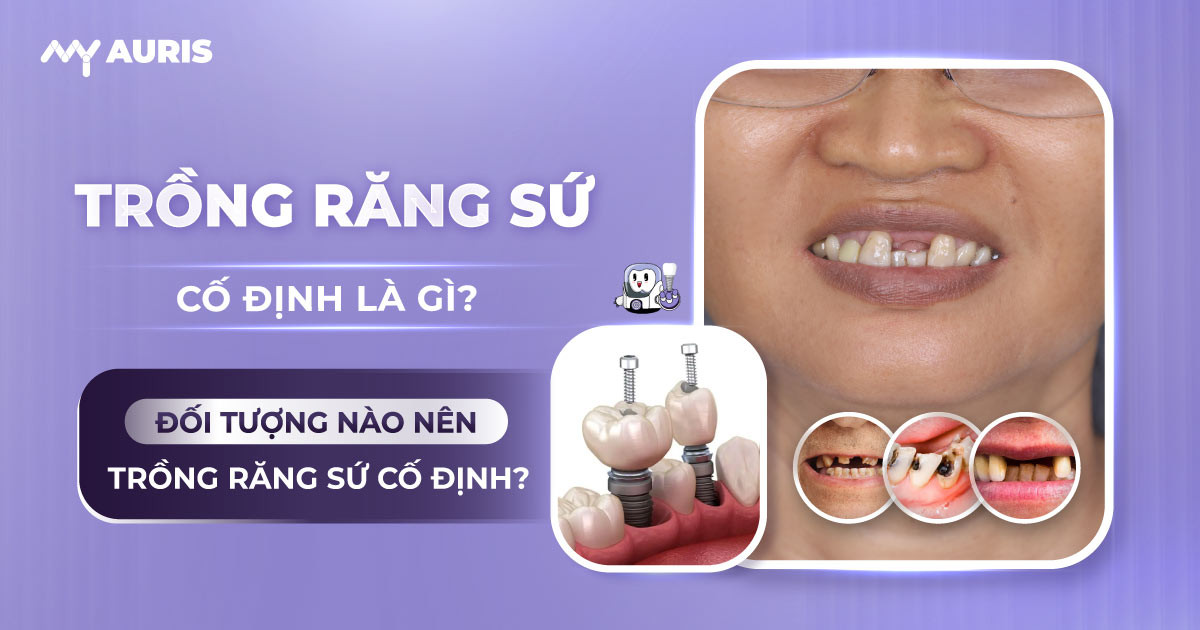Fixed dentures are favored for their ability to restore chewing function and communication. However, a clear understanding of fixed implant dentistry, along with its advantages and disadvantages, is not yet widespread. Don’t worry! My Auris Dental Clinic will answer all your questions about this advanced dental technique. Let’s find out now for a confident and healthy smile!
What is Fixed Porcelain Teeth Restoration?
Fixed porcelain teeth restoration is a specialized technique in modern dentistry, applied to comprehensively restore lost teeth. This method involves permanently attaching prosthetic teeth directly to the jaw arch, perfectly replacing missing natural teeth. Unlike traditional removable dentures, fixed porcelain teeth provide a true-to-life feel, durability, and high aesthetics.
A prominent feature of this method is that it offers numerous superior benefits. Patients can chew comfortably, no longer worrying about their teeth coming loose or falling out during use. Simultaneously, oral hygiene becomes easier and more effective compared to conventional removable solutions.
Not only does fixed porcelain teeth restoration improve chewing function, but it also helps prevent the effects of facial aging, maintaining natural facial structure. Furthermore, fixed teeth placement helps limit loose and misaligned teeth, thereby preventing the risk of widespread tooth loss in the future.
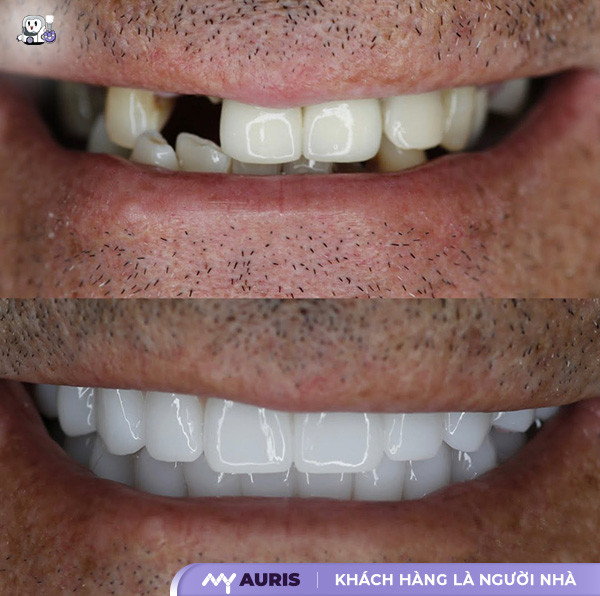
Fixed Porcelain Teeth Restoration Methods for Tooth Loss
Currently, in dentistry, two methods—fixed porcelain teeth restoration and semi-fixed teeth restoration—are widely chosen to restore missing teeth. Each method has its own strengths and limitations, with Implant placement being highly regarded for its superior effectiveness and durability.
Full Arch Fixed Dentures using All-on-4 Implant Method
Full arch fixed dentures with the All-on-4 Implant technique is a modern solution in implant dentistry, suitable for individuals with complete tooth loss. This method utilizes 4 to 6 sturdy implant posts directly placed into the jawbone, onto which a fixed set of porcelain or composite teeth is then attached. This process ensures comprehensive tooth restoration: strong chewing function, durability, and high aesthetics, guaranteed for a lifetime of use.
Outstanding Benefits of Full Arch Fixed Dentures with All-on-4 Implants:
Strong chewing capability: Thanks to the robust implant post system, the chewing force is almost equivalent to natural teeth. Users can chew comfortably without worrying about looseness or discomfort.
High durability, lifelong stability: Fixed dentures with implants do not wear down or become loose over time, providing peace of mind for long-term use.
Superior aesthetics: Porcelain or composite full arches are designed to be uniform, beautiful, and naturally colored as desired. This method also helps correct issues like underbite and sunken cheeks caused by long-term tooth loss, providing a more youthful appearance.
Easy oral hygiene: Since the teeth are fixed and do not require daily removal, oral care and cleaning become as simple as with natural teeth.
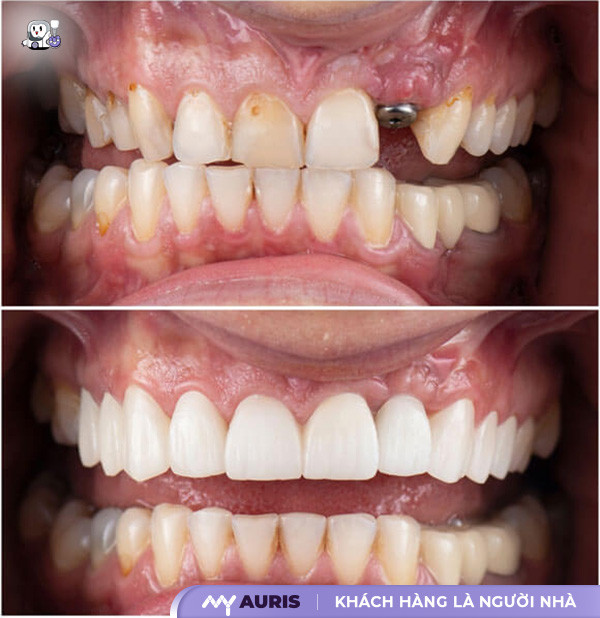
Single Implant Placement – A Modern Fixed Teeth Restoration Solution
Dental implant placement, also known as implant dentistry, is an advanced fixed teeth restoration method that comprehensively rebuilds teeth from the root to the crown. This process uses implant posts made from pure Titanium – a material proven to have high biocompatibility and be absolutely safe for the body.
After being embedded into the jawbone, the implant post will gradually integrate biologically with the bone within 3-6 months, forming a stable foundation similar to a natural tooth root. Subsequently, the dentist will use an Abutment connector to attach a porcelain crown, completing the prosthetic tooth with aesthetics and chewing function indistinguishable from a natural tooth.
This method is particularly suitable for individuals with multiple missing teeth or complete edentulism. A notable advantage is that it does not require grinding down healthy teeth, thus maximizing the preservation of jaw arch health. Moreover, with good oral hygiene, implant teeth can last up to 20 years or longer.
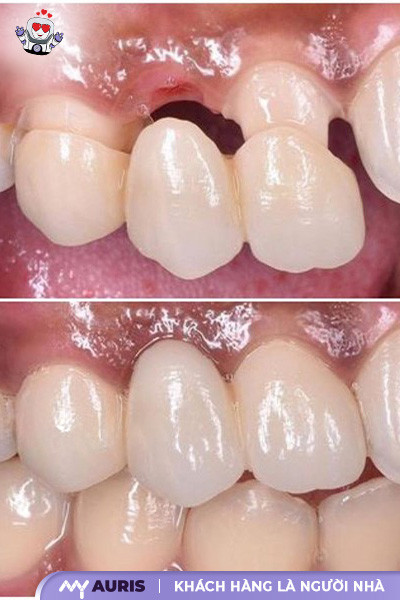
Porcelain Dental Bridge – An Effective and Quick Semi-Fixed Porcelain Teeth Restoration Solution
A porcelain dental bridge is a semi-fixed porcelain teeth restoration method highly regarded by dentists for its rapid and aesthetic restorative effects. The dentist will prepare teeth on both sides of the missing tooth gap to create abutments for supporting the bridge. Subsequently, a technician will fabricate the porcelain bridge with the corresponding number of teeth, including both the prepared teeth and the missing tooth, and then proceed to restore the tooth crowns onto the dental arch.
A notable advantage of this method is its quick completion time, typically within 2-3 days, providing immediate results. Oral hygiene is also very easy, with almost no difference compared to natural teeth. Specifically, this method helps restore 60-70% of chewing power, allowing patients to eat more comfortably in their daily lives.
However, a porcelain dental bridge does not prevent jawbone resorption, which can lead to gum recession in the long run, affecting the aesthetics of the missing tooth area. Furthermore, grinding down abutment teeth can weaken them, easily leading to gum exposure or even fracture of the abutment teeth if not properly cared for. Therefore, this method is only suitable for cases with few missing teeth and sufficiently strong abutment teeth.
Who Should Consider Fixed Porcelain Teeth Restoration?
Fixed porcelain teeth restoration is a modern dental technique, highly valued for its ability to effectively restore chewing function and aesthetics for individuals with tooth loss. However, not everyone is eligible for this method. Identifying the right candidates is a key factor in the dental consultation process.
Cases where fixed dentures are recommended:
- Individuals with one or more missing teeth in the dental arch, severely affecting oral health and chewing function.
- Individuals with a strong jawbone structure, good oral health, and no inflammatory conditions – critical factors for successful implant placement and stable, long-term prosthetic teeth attachment.
Individuals who should not undergo fixed dentures:
- Young children whose jawbone system has not fully developed and pregnant women, as implant placement may affect the mother’s oral health and fetal development.
- Individuals with uncontrolled cardiovascular disease, diabetes, or cancer, as these conditions can easily lead to complications during surgical intervention.
- Patients who have recently undergone major surgery or are in the recovery phase, needing to postpone dental implants to ensure maximum safety.
Is Fixed Porcelain Teeth Restoration Painful?
Is fixed porcelain teeth restoration painful? This is a common question for many seeking solutions for missing teeth. According to experienced dentists, the process of fixed porcelain teeth restoration nowadays causes virtually no significant pain. This is because the dentist will administer local anesthesia before performing the procedure. Under the effect of the anesthetic, the patient will feel no discomfort throughout the treatment.
However, to ensure absolute safety, patients should choose a reputable dental clinic with modern facilities, a closed sterile procedure, and a team of experienced dentists. This helps minimize the risk of infection and cross-contamination, ensuring effectiveness and long-lasting results.
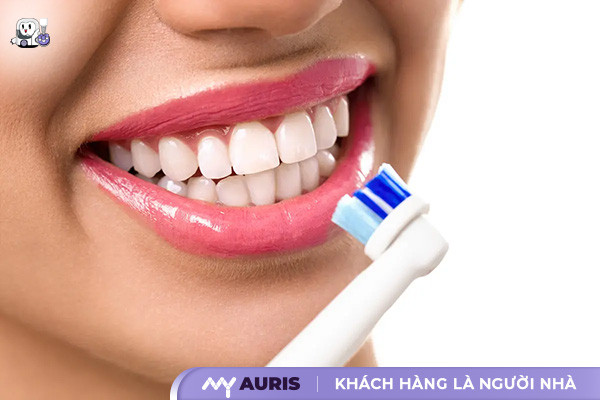
Post-Procedure Care for Fixed Porcelain Teeth Restoration
After fixed porcelain teeth restoration, proper care and hygiene of the porcelain teeth play a crucial role in the recovery process and in preventing complications such as gum inflammation, bad breath, or crown damage. Here are guidelines from dental experts to help you maintain strong and healthy teeth for a long time:
Prioritize using low-abrasive toothpaste to avoid scratching the porcelain glaze, preserving the natural shine of your teeth.
Brush teeth twice a day – in the morning after waking up and in the evening after meals – to remove bacteria and accumulated plaque.
Gently use dental floss to clean food debris between teeth. However, you should avoid flossing around the newly placed fixed prosthetic teeth to prevent damaging gum tissue.
Use interdental brushes, water flossers, or rubber tips to aid in deep cleaning inside the oral cavity – especially in hard-to-reach areas.
Use an antibacterial mouthwash daily to increase germ-killing effectiveness and reduce the risk of gum inflammation.
Eat soft foods such as porridge, soup, or purees in the first few days after tooth restoration to reduce pressure on the new dental area.
Chew gently, avoiding strong force, especially on the side where teeth have just been restored.
Supplement vitamin C and vitamin E from fresh fruits to boost resistance and support gum tissue healing.
Eat plenty of eggs, fish, and milk to increase calcium intake, contributing to strengthening tooth roots and jawbone tissue.
Proper oral care after fixed prosthetic teeth placement not only extends the lifespan of porcelain teeth but also prevents many unfortunate complications. If you are researching porcelain teeth restoration methods, choose a reputable dental facility with a specialized team of doctors for the most accurate consultation and treatment plan.


